In the figure (i) half of the meter scale is made of wood while the other half, of steel. The wooden part is pivoted at O. A force F is applied at the end of steel part. In figure (ii) the steel part is pivoted at O and the same force is applied at the wooden end

More acceleration will be produced in (i)
More acceleration will be produced in (ii)
Same acceleration will be produced in both conditions
Information is incomplete
The correct Answer is:B
Since, τ=Iα
implies α=τIandα∝1I
Topper's Solved these Questions
- ROTATIONAL MOTIONBOOK - ERRORLESSCHAPTER - ROTATIONAL MOTIONEXERCISE - Assertion & Reason
25 Videos
- ROTATIONAL MOTIONBOOK - ERRORLESSCHAPTER - ROTATIONAL MOTIONEXERCISE - ASSERTION AND REASON
25 Videos
- NEWTON'S LAWS OF MOTIONBOOK - ERRORLESSCHAPTER - NEWTON'S LAWS OF MOTIONEXERCISE - ASSERTION & REASON
18 Videos
- SIMPLE HARMONIC MOTIONBOOK - ERRORLESSCHAPTER - SIMPLE HARMONIC MOTIONEXERCISE - Assertion & Reason
15 Videos
Similar Questions
In first figure a meter stick, half of which is wood and the other half steel is pivoted at the wooden end at A and a force is applied at the steel and at O. On second figure the stick is pivoted at the steel end at O and the same force is applied at the wooden end at A. The angular acceleration.
 .
.
View SolutionA meter stick, half of which is wood and the other half steel, is pivoted at the wooden end and same force isapplied to the steel end. Next, it is pivoted at the steel end and the same force is applied at the wooden end. Does one getthesame angular acceleration in eachcase ? Explain
View Solution
Knowledge Check
In first figure a meter stick, half of which is wood and the other half steel is pivoted at the wooden end at A and a force is applied at the steel and at O. On second figure the stick is pivoted at the steel end at O and the same force is applied at the wooden end at A. The angular acceleration.
 .Ain first is greater than in secondBequal in both first and secondCin second is greater than in firstDNone of the above.
.Ain first is greater than in secondBequal in both first and secondCin second is greater than in firstDNone of the above.Figures 1 and 2 below show a meter stick, haif of which is wood and half of which is steel. (Steel is denser than wood). In figure 1, the stick is pivoted at the wooden end, at O, and a force F is applied to the steel end. In figure 2, the stick is pivoted at the steel end at O, and an identical force is applied to the wooden end. [Neglect Gravity].
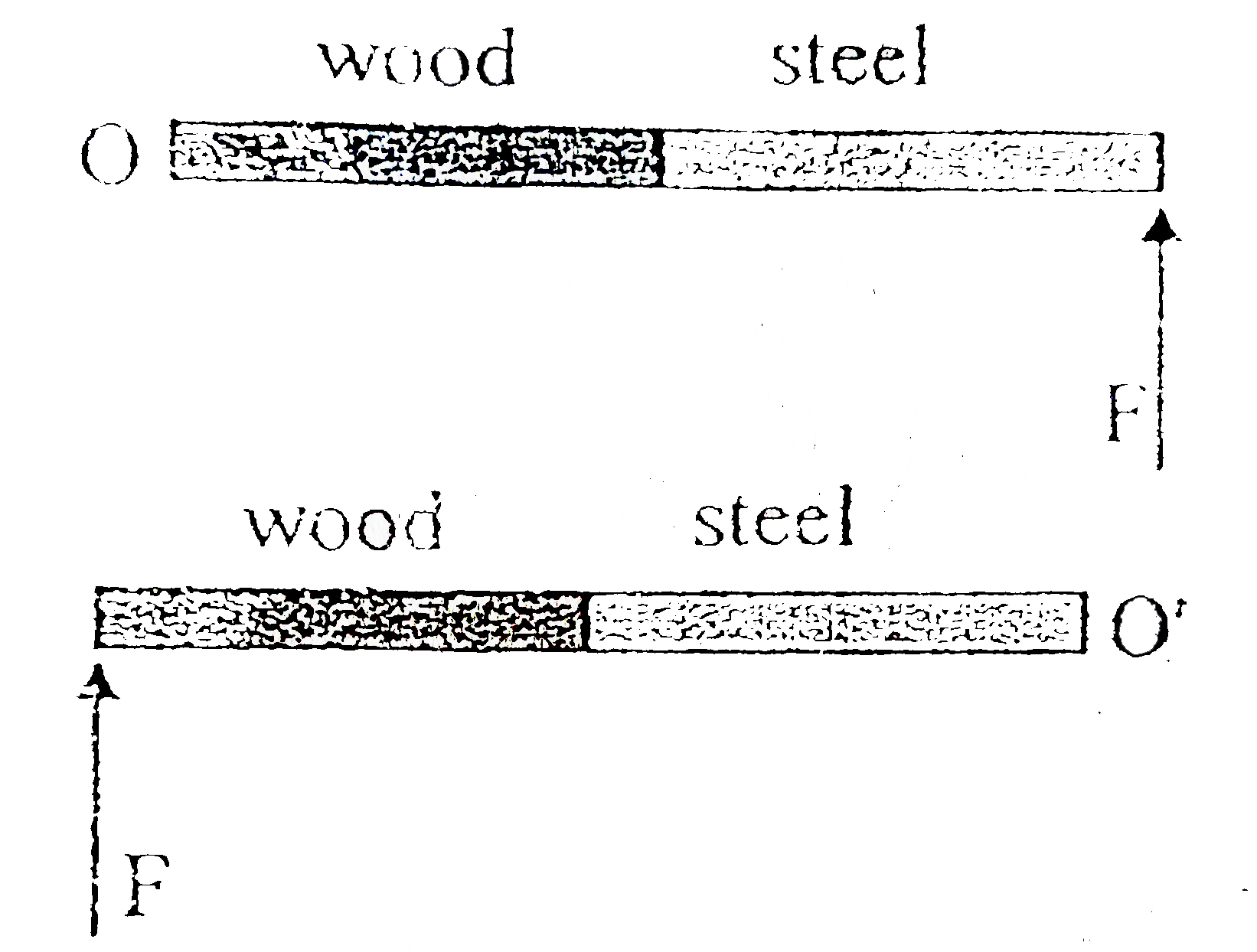 AThe angular acceleration will be greater for the stick in figure. 1. because the torque about Q is greater than the torque about O'BThe angular acceleration will be greater for the stick in figure 2, because the torque about O' is greater than the torque about O.CThe angular acceleration will be greater for the stick in figure 1 because the rotational inertia about O is smaller than the rotational inertia about O'DThe angular acceleration will be greater for the stick in figure 2 because the rotaional ineria about O' is smaller man the rotational ineria about O.
AThe angular acceleration will be greater for the stick in figure. 1. because the torque about Q is greater than the torque about O'BThe angular acceleration will be greater for the stick in figure 2, because the torque about O' is greater than the torque about O.CThe angular acceleration will be greater for the stick in figure 1 because the rotational inertia about O is smaller than the rotational inertia about O'DThe angular acceleration will be greater for the stick in figure 2 because the rotaional ineria about O' is smaller man the rotational ineria about O.The adjacent figure shows a non-uniform metre stick AB having the linear mass density variation λ=λ0x , where λ0 is a constant and x is the distance from end A, placed on a smooth horizontal surface. In the first experiment, the rod is pivoted at A and force F is applied perpendicular to the rod at the other end B and in the second experiment, the rod is pivoted at B and the force is applied perpendicular to the rod at the end A. If in the first case angular acceleration is αA and in the second case it is αB then
 AαA=αBBαA>αBCαA<αBDdata insufficient to determine
AαA=αBBαA>αBCαA<αBDdata insufficient to determine
In the figure at the free end a force F is applied to keep the suspended mass of 8 kg at rest. The value of F is :
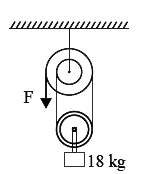
View SolutionIn the figure at the free end a force F is applied to keep the suspended mass of 18 kg at rest. The value of F is-
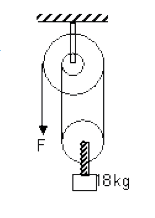
View SolutionA wire of length L extends by l on application of force F. Suppose the wire is cut into 3 equal parts and the same force is applied to one of them. Now the extension will be
View SolutionIn the figure (i) a uniform string is fixed at one end and the other end is pulled by a tension T. another force T acts at mid point of the string. In figure (ii) another identical string is pulled by tension T at both the ends. The ratio of elongation in equilibrium of string (i) to the elongation of string in (ii) is
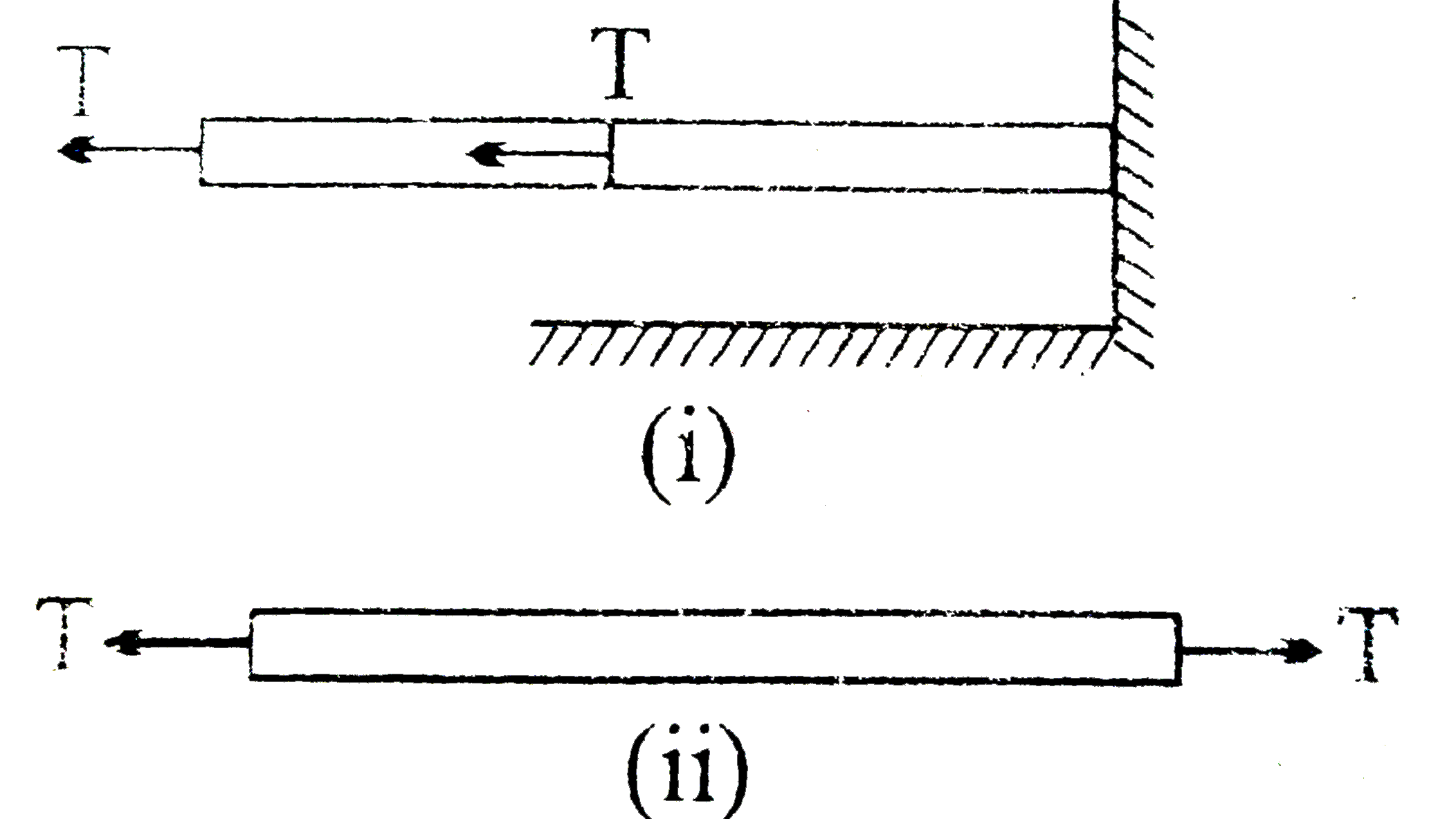
View SolutionA rod not toching the flor is inserted between two identical boxes (see figure) There is a very small gap between the rod and and boxes ,A horizontal force F is applied at the upper end of the rod There is frication between boxes and the floor Assume that the od remains almost vertical after the force is applied which of hte following is /are correct?
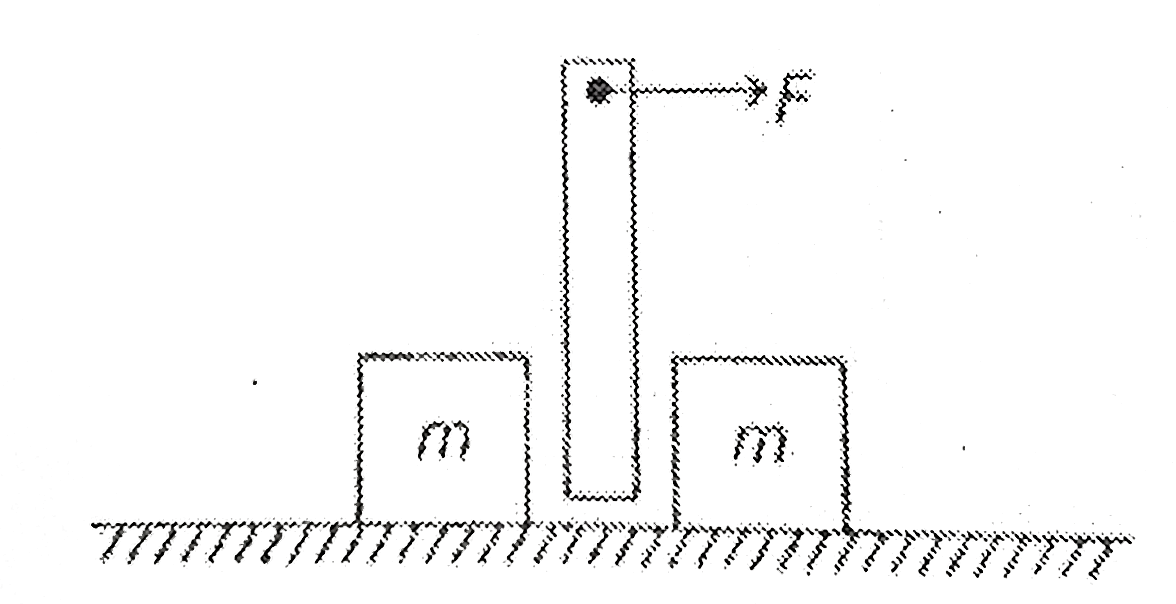
View Solution
